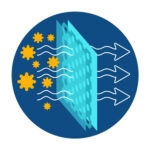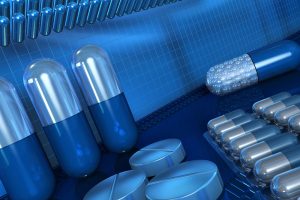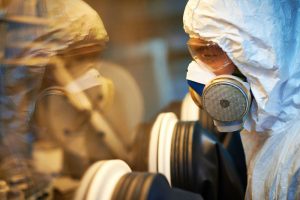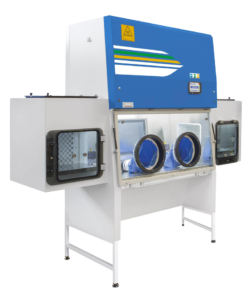
Selecting the Right Fume Cupboard for Your Research Lab: Ducted vs. Recirculating
May 20, 2025
Dust Is the Enemy: How Laminar Flow Cabinets Keep Tech Manufacturing Flawless
November 19, 2025Why Isolators Are Essential in Biotech and Pharmaceutical Manufacturing
 In the tightly controlled environments of biotechnology and pharmaceutical manufacturing, ensuring sterility and operator safety is non-negotiable. Processes involving high-potency drugs, cytotoxic compounds, or delicate biologics demand equipment that eliminates contamination risks and protects both personnel and product. That’s where isolators have become essential.
In the tightly controlled environments of biotechnology and pharmaceutical manufacturing, ensuring sterility and operator safety is non-negotiable. Processes involving high-potency drugs, cytotoxic compounds, or delicate biologics demand equipment that eliminates contamination risks and protects both personnel and product. That’s where isolators have become essential.
An isolator is a sealed, controlled-environment chamber that separates operators from materials being handled. Using HEPA or ULPA filtration and pressure-controlled airflow, isolators maintain ultra-clean environments, enabling safe handling of both sterile and hazardous substances.
To ensure this, isolators are accessed via glove ports and incorporate tightly sealed airlocks or transfer hatches to move materials in and out without breaking containment. They operate under either positive or negative pressure, depending on the application. Positive-pressure isolators are designed to protect the product—ideal for aseptic processing—while negative-pressure isolators protect the operator when handling toxic or dangerous substances, such as chemotherapy drugs. The team at Faster s.r.l. in Italy has designed developed isolators suited for both purposes. The GloveFAST Aseptic isolator creates a sterile, positive-pressure environment perfect for compounding and microbiological testing. The GloveFAST Cyto Pharma model, in contrast, maintains negative pressure to safely manage cytotoxic drugs, ensuring both product sterility and operator protection.
The team at Faster s.r.l. in Italy has designed developed isolators suited for both purposes. The GloveFAST Aseptic isolator creates a sterile, positive-pressure environment perfect for compounding and microbiological testing. The GloveFAST Cyto Pharma model, in contrast, maintains negative pressure to safely manage cytotoxic drugs, ensuring both product sterility and operator protection.
One of the core advantages of isolators is their ability to prevent cross-contamination. In cleanrooms, people remain the greatest source of particles and microbes. By removing direct human contact and replacing it with sealed systems, isolators significantly lower the risk of contamination. Materials enter the isolator via decontamination chambers or sealed transfer ports, ensuring continuous integrity of the sterile field.
Isolators are also vital for operator safety, particularly when handling hazardous drugs or high-potency active pharmaceutical ingredients (HPAPIs). Negative-pressure systems contain these substances securely, protecting operators from accidental exposure. In addition to safety, isolators offer major regulatory and operational benefits. As regulatory bodies such as the FDA and EMA demand increasingly higher standards for contamination control, isolators provide a reliable path to compliance with Good Manufacturing Practices (GMP). Their self-contained nature reduces the need for complex gowning procedures and intensive cleanroom maintenance, lowering overall operating costs.
In addition to safety, isolators offer major regulatory and operational benefits. As regulatory bodies such as the FDA and EMA demand increasingly higher standards for contamination control, isolators provide a reliable path to compliance with Good Manufacturing Practices (GMP). Their self-contained nature reduces the need for complex gowning procedures and intensive cleanroom maintenance, lowering overall operating costs.
The use of isolators spans the full range of life sciences. In biotech laboratories, they’re used for tasks like cell culture, sterility testing, and viral vector production—processes where even minute contamination can compromise outcomes. In pharmaceutical manufacturing, isolators support aseptic filling, sterile compounding, and the handling of high-risk materials.
Many companies now integrate isolators into fully automated production lines, reducing human intervention and boosting efficiency. Faster Air’s isolators, for example, can be incorporated into modular systems, streamlining everything from sterile filling to environmental monitoring.
The long-term advantage for the use of isolators is clear. With fewer contamination events, reduced cleaning and gowning costs and improved product yields, isolators can provide a great return on investment.
Looking ahead, the industry is moving toward even greater automation and integration. Advanced isolators are now being paired with robotics, smart sensors and digital monitoring tools to further reduce risk and improve consistency. As personalised medicine, gene therapies and high-potency drugs become more common, isolators will be central to meeting the demands of both regulators and patients.
In today’s biotech and pharmaceutical landscape, isolators are more than just equipment—they are an essential infrastructure for ensuring safe, sterile, and scalable production.
Frequently Asked Questions
What is an isolator in pharmaceutical manufacturing?
An isolator is a sealed, controlled-environment chamber used to maintain sterility and protect operators from hazardous substances during drug production.
What is the difference between a positive and negative pressure isolator?
Positive-pressure isolators protect the product by pushing air out, keeping contaminants away. Negative-pressure isolators protect the operator by containing hazardous materials inside.
Why are isolators used instead of cleanrooms?
Isolators reduce contamination risks by removing direct human interaction, offering greater sterility and operator safety with lower long-term operational costs.
What industries use isolators?
Isolators are widely used in biotechnology, pharmaceuticals, compounding pharmacies, and laboratories that handle sterile or hazardous materials.
Are isolators GMP-compliant?
Yes. Isolators support GMP compliance by minimizing contamination risks, reducing operator intervention, and simplifying environmental monitoring.
As Biopharma Group is the exclusive distributor of Faster s.r.l. isolators for mainland UK, explore our range of positive and negative isolators for sterile and cytotoxic applications, or contact our team for expert guidance.
